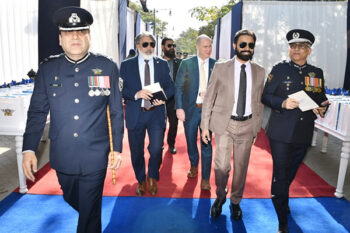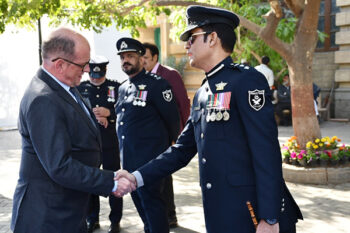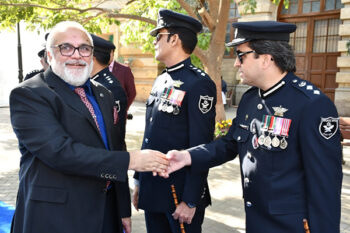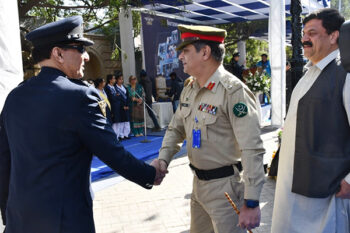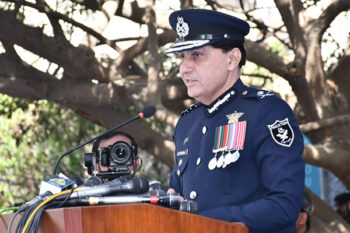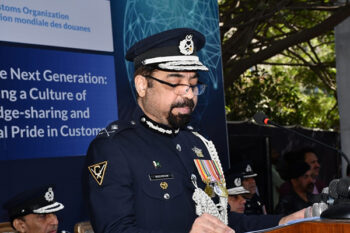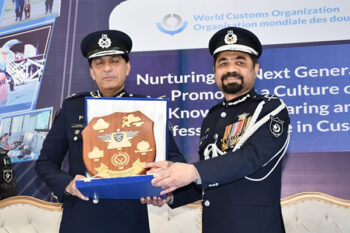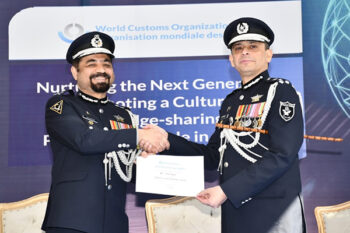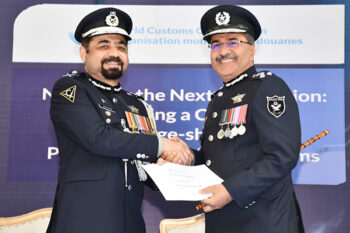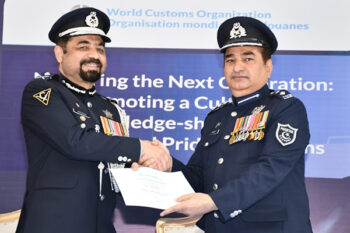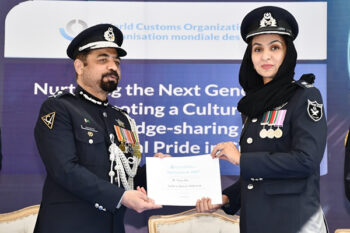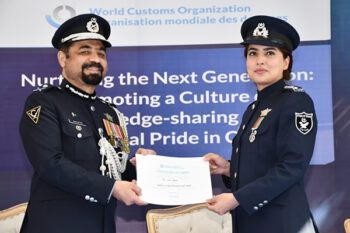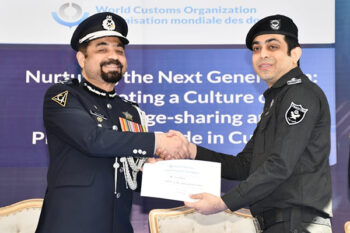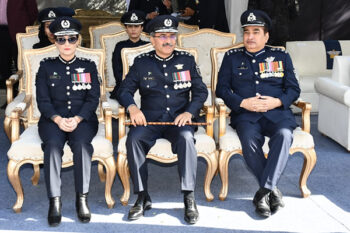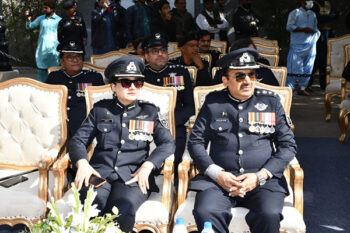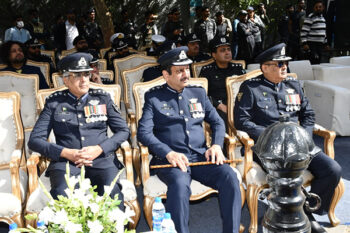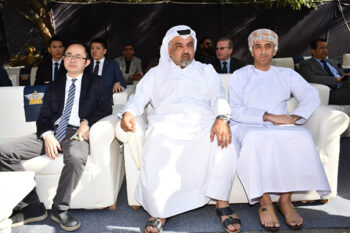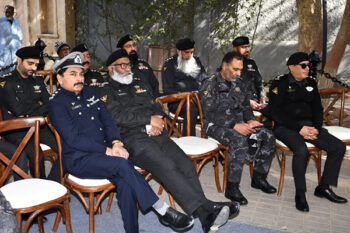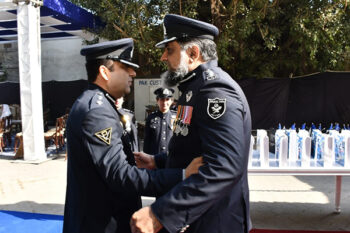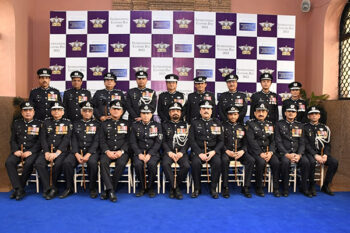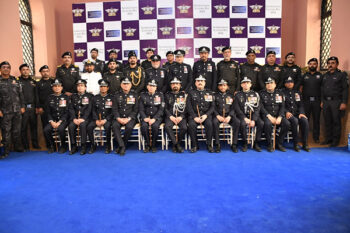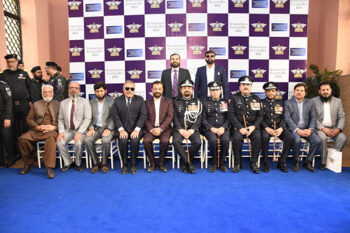MESSAGES

MUHAMMAD SHEHBAZ SHARIF PRIME MINISTER OF PAKISTAN ON INTERNATIONAL CUSTOMS DAY (26TH JANUARY, 2023)
On the occasion of International Customs Day 2023, I would like to felicitate Pakistan Customs for their efforts and contribution as a border control agency in restricting the movement of illicit goods, maximizing revenue collection, and facilitating bonafide trade. It is noteworthy that during the previous decade, Pakistan Customs has efficiently equipped itself with latest digital technologies resulting in expeditious clearance of import and export cargo, thus creating ease of doing business and improving the overall business environment in the country.
I believe that a vibrant organization must not rest on its laurels and continuously strive for excellence. This year’s International Customs Day theme of “Nurturing the next Generation: promoting a culture of knowledge-sharing and professional pride in Customs” presents another opportunity for making improvements and emphasizes the need for laying down a strong foundation for the young generation to learn, grow and develop a specialized skill set based on knowledge and free flow of information. This will ultimately lead to professionalism and pride in serving the nation.
Pakistan Customs should keep striving to guard the economic frontiers of the country against revenue evasion and smuggling with utmost dedication, diligence and honesty. The Customs authorities should take pride in tackling the challenges and rendering services to the nation while also remembering the services of many Customs functionaries who laid down their lives in the line of duty. Their sacrifices should also be revered on this occasion as it will inspire the young generation of officers to perform their duties fearlessly and develop a true sense of commitment and dedication.
On the occasion of International Customs Day, I would also like to urge all ranks of Pakistan Customs to come forward and play their part in overcoming the economic challenges currently faced by the country by fighting the menace of smuggling and evasion of duties and taxes to meet the revenue targets.
I hope Pakistan Customs will rise to the challenge and keep serving the nation with dedication and commitment.
“NURTURING THE NEXT GENERATION: PROMOTING A CULTURE OF KNOWLEDGE-SHARING AND PROFESSIONAL PRIDE IN CUSTOMS”
THE FINANCE MINISTER
THE INTERNATIONAL CUSTOMS DAY, 2023
This indeed gives me great pleasure to celebrate this year’s International Customs Day focusing on the promotion of human resource. knowledge sharing and professional pride in Customs Service. I congratulate the WCO in inviting attention of the Customs all over the world towards an important theme which is critical for the organizational service delivery. The success of any organization fundamentally lies in its human resource, systems, procedures and service delivery. Pakistan Customs has been investing immensely in transforming its systems and procedures with the help of information technology. In coordination with the WCO and the use of modern technology. Pakistan Customs has significantly contributed to the progression of the organization on modern lines to ensure better service delivery to the trade and industry.
Pakistan Customs has transformed its clearance system in line with the international best practices and WCO guidelines. Through Pakistan Single Window platform, trade has been facilitated to interact with multiple regulatory agencies through a single platform for processing their trade related regulatory processes and requirements. These measures have modernized the way of working and have brought much needed transparency, efficiency and confidence Of the stakeholders particularly among trade and businesses.
I would also like to reverberate focus on inculcating sense of professional pride in the work and service delivery of the organization. The enabling environment built through projects such as WeBOC clearance system, PSW outreach to regulatory agencies, pre-arrival clearances and managing trade through IT applications have successfully created astrong IT based trade processing infrastructure in the country.This has not only reduced the cost of doing business on one hand but has also ensured higher level of trade facilitation.
We acknowledge that Customs modernization interventions have increased the ease Of doing business in Pakistan and have reduced the distortions in processing Of import and exports across borders. I appreciate the Pakistan Customs’ efforts in leveraging modern technology with a sense of dedication, embedded with the purpose of serving this nation and achieving the goals of revenue collection, trade facilitation and national development.
Finally. I once again congratulate the entire Customs fraternity on the occasion of International Customs Day.

ON INTERNATIONAL CUSTOMS DAY 26th JANUARY, 2023
It is a matter of immense pleasure for me to extend my warmest greetings to the officers of Pakistan Customs on the occasion of International Customs Day, 2023. The theme of this year’s event “Nurturing the next Generation: promoting a culture of knowledge sharing and professional pride in Customs” marks the resolution of Customs organizations around the world to foster an environment of sharing professional expertise and knowledge to build a more collaborative and innovative workforce that is better equipped to meet the challenges of the future. This knowledge sharing can either be done through focused and structured training programs or by informal means such as developing a culture of sharing experiences at the work place amongst each other.
Promoting a culture of knowledge based learning within the organization is not only crucial for meeting the challenges faced by the Customs officers in carrying out their core functions but it also inculcates a sense of pride on achieving the desired results. The Customs administrations should always work towards building a sense of ownership and dignity amongst all ranks of the force while encouraging the officers and officials to take pride in their work and highlight the importance of their role in ensuring the safety and security of our borders.
Pakistan Customs has been at the forefront of the road to modernisation and made significant achievements, by adopting the latest business intelligence and data analytics tools in its computerized clearance system. Through its flagship project of Pakistan Single Window, Pakistan Customs is already a notch above many other cross border agencies which is a matter of immense pride. However, the journey to excellence never stops and Organizations need to reinvent themselves as per changing requirements. As the future belongs to the next generation, it is therefore, imperative upon the Customs officers to mentor the next generation and inculcate the values of hard work, discipline, and integrity among them. We must make efforts to create positive awareness among the youth about the crucial role being played by the Customs in safeguarding the economic frontiers of the country.
I once again take this opportunity to congratulate the entire of Pakistan Customs Service on this auspicious occasion.

MEMBER (CUSTOMS-OPERATIONS) ON THE OCCASION OF INTERNATIONAL CUSTOMS DAY, 2023
On the occasion of International Customs Day, I extend my heartiest felicitations to all the officers and officials of the Pakistan Customs fraternity.
This year, the International Customs Day is being celebrated all over the world with the theme of “Nurturing Next Generation Promoting a culture of knowledge sharing and professional pride in Customs” which exactly reflects the current efforts of Pakistan Customs to develop its human capital, with particular focus on new recruits and younger officers.
Customs administration have always played a key role in facilitating and developing economic linkages across courtiers while simultaneously guarding against illicit trade. In developing countries like Pakistan, Customs administrations have assumed another crucial role of revenue generation. Customs related work requires technical expertise, which in turn demands high standards of knowledge, professionalism, and advanced skill set. It is therefore imperative upon the Customs officers to keep striving to acquire knowledge regarding international best practice, modern techniques, upgraded skill sets, advanced process & procedure to perform their job more effectively and efficiently. At Pakistan Customs, it is our aim to create an environments of learning and knowledge sharing through rigorous training programs, participation in discussion forum, and public private dialogue.
In line with the government’s policy to strengthen Customs controls and to meet the challenges arising out of expansion and diversification of Pakistan’s International Trade, Pakistan Customs has always taken pride in creating ease of doing business by launching trade facilitation scheme. Some of the recent initiative includes the Pakistan Single Window, Virtual Assessment system, Port Community System and Export Facilitation Scheme. Further, Pakistan Customs has recently entered into landmark agreements for data sharing and Customs cooperation with a number of courtiers including China, Tajikistan and Russia. All these initiatives will result in more efficient Regional and International Trade, transparent disposal of work as well as knowledge sharing and creation of a high professional workforce.
On this day, we revere the sacrifices made by the Customs officers/officials who laid down their lives in the line of duty. Commemorating their sacrifices and achievements also inculcates a sense of pride amongst the Customs officers. I hereby urge all the officers of Pakistan Customs to strive for achieving the highest standards of professional expertise, transparency and courtesy. I am confident that by adhering to these values, Pakistan Customs Service shall play its crucial role effectively in protecting Pakistan’s economic frontiers, and contribute to its business and citizens.
At the end, I again congratulate the entire Customs fraternity on this auspicious occasion of International Customs Day.

THE SPECIAL ASSISTANT TO PRIME MINISTER ON REVENUE ON THE OCCASION OF INTERNATIONAL CUSTOMS (26th JANUARY, 2023)
I extend my heartiest felicitations to the fraternity of Pakistan Customs on the International Customs Day, 2023, which being a signature event, highlights the role played by Pakistan Customs in protecting the economic frontiers of the country. Customs authorities perform a wide range of functions spanning from collection of government revenues, trade facilitation, enforcement measures taken against illicit trade and smuggling of goods. The theme for this year’s International Customs Day “Nurturing the next Generation: promoting a culture of knowledge-sharing and professional pride in Customs” encapsulates the development of requisite human capital and organizational capabilities amongst Customs administration to perform the versatile roles through nurturing the young customs officers, promoting knowledge sharing, enhancing institutional learning and inculcating professional pride.
It is heartening to see that the officers of Pakistan Customs Service have played a praise- worthy role – in line with the vision of the Federal Board of Revenue in accomplishment of state-of- the-art information and communication technology solutions such as Pakistan Single Window (PSW). For sustaining such initiatives, it is imperative that, in line with the present theme of International Customs Day, Customs functionaries acquire insights, experience and professional aptitude for effective performance of their functions. At the same time, the role of the senior management in Pakistan Customs is equally significant in providing an environment to the next generation so that they are able to play a pivotal role in the economic, social, and environmental sustainability of the country.
It is also crucial to promote a sense of professional pride amongst the Customs fraternity, especially the young officers for motivating them to perform to the best of their abilities. I firmly believe that the young generation can play an instrumental role in aiding our country to be economically stronger.
In the end, I once again congratulate Pakistan Customs on the occasion of International Customs Day and wish a very resulted-oriented year ahead.

Karachi Customs Agents Association (KCAA) wishes the Customs worldwide community a cheerful International Customs Day.
The world customs community is celebrating International Customs Day on 26th January 2023 across the globe and we are proud represent the Karachi Customs Agents Association which is the most proactive true representative body of Customs Agents working in Karachi and we are proud to serve the Custom Agent community since the past 55 years by contributing efforts to resolve the issues / problems that are faced by the trade at all forums.
In the prevailing scenario global trade requires international cooperation and coordination among governments and trade bodies. It compels in sharing and improving knowledge within the customs community. This year’s theme of “Nurturing the next generation: promoting a culture of knowledge sharing and professional pride in customs” creates a sense of new responsibilities which cannot be addressed without the necessary skills, knowledge and connectivity.
Pakistan Customs being an active member of the International Customs family interact with customs organizations of the other countries under the aegis of the World Customs Organization. This interaction helps support the smooth and lawful flow of goods, services, people, technologies, capital, culture and ideas. This connectivity with the international organizations paves way for modernization and economic development of the country.
Pakistan Customs plays a pivotal role in economic development through targeted controls and the facilitation of legitimate trade. Pakistan Customs has always remained in the forefront of liberalization and rationalization of the trade regime and procedures in supporting government’s initiatives to facilitate and enhance trade with international partners. The ongoing restructuring of tax administration and automation of Customs procedures, in line with international best practices, will go a long way in integrating Pakistan’s economy with the global economy and harnessing the fruits of globalization.
I also would like to appreciate the role of Directorate of Reforms and Automation and Pakistan Single Window towards the modernization of the system which has made it possible to handle increased volumes of trade today.
In such an environment, the task of customs agents is highly important in helping the government to achieve an appropriate balance between trade facilitation and regulatory control. Karachi Custom Agents Association and its members have proven from time to time that they are at the vanguard with customs to maintain that balance. The Karachi Customs Agents Association is especially grateful to Pakistan Customs for making us a part of the International Customs Day. I wish to convey my best wishes to the Pakistan Customs on the International Customs Day.

I extend my warm greetings to officials of the Pakistan Customs. The World Customs organization is celebrating its 71st anniversary this year and we are proud that Pakistan Custom is playing a key role in development of this progressive country through efficient targeted controls and the facilitation of lawful trade. The World Customs Organization (WCO), has announced that 2023 will be devoted to the united efforts of the global Customs community to take on a leadership role, using innovative technologies, and collaborating with its stakeholders in bracing for the future, with the slogan “Nurturing the next generation: promoting a culture of knowledge sharing and professional pride in customs”
International Customs Day celebrates all the customs officials and agencies that toil day in and day out to ensure effective world trade management. The officials also ensure the smooth functioning of trade operation across international borders and put people at the very center of the transformation process. Customs authority is responsible for collecting tariffs and overseeing the import and export of goods from industrial raw materials to consumer products. International Customs Day carries immense value as we get an opportunity to express gratitude to customs officials for working tirelessly and ensuring secure administration. Secondly, the day also highlights importance of staying informed with custom laws and regulations and lastly, the day also celebrates international trade across borders whilst helping the economy thrive.
The theme for this year follows “Nurturing the next generation: promoting a culture of knowledge sharing and professional pride in customs”. The first aspect highlights a culture that fosters on knowledge sharing and this can be achieved through aligning Pakistan Custom’s culture and technical infrastructure towards open communication. Instilling a knowledge sharing culture assists in an employee’s personal development and in today’s fast paced world, it is imminent to implement such strategies to be able to achieve goals and objectives much more efficiently. Knowledge sharing is a long-term strategy and with the right guidance from experienced higher customs officials, the organization can witness an immense boost in their growth. The second aspect highlights taking professional pride in customs It is pivotal to develop such a culture that our next generations are able to take inspiration and develop a sense of pride for customs officials who have worked tirelessly to improve current conditions of the organization and enhancing economic development of the nation.
Pakistan Customs is amongst very few organizations in the country who pioneered in designing and automating their clearance and audit systems in the country. Pakistan Customs is pursuing a broad-based reforms strategy through a careful re-assessment of its role and objectives and by aligning of its operational ethos with the prevalent international standards. The two fundamentals planks of the reforms strategy are the simplification of its business processes and automation of cargo clearance procedures at all national ports. As technological innovation is taking over the global business sector, Pakistan Customs is also implementing newer business models so as to boost economic growth and enhance overall efficiency. It is known fact that increase in trade volumes cannot be handled without state of the art clearance system and the department’s efforts in this regard are highly appreciated. Pakistan Customs has come a long way over the years, and the institution has went through radical changes which has now transformed Pakistan Customs into a proactive organization in the country.
The Pakistan Single Window initiative led by Pakistan Customs aims at reducing the time and cost of doing business by digitalizing Pakistan’s cross border trade and eliminating paper based manual processes. Pakistan Single Window (PSW) is a technology-based facility that allows all the stakeholders and departments involved in trading to submit and analyze the credentials for import, exports and transit-related regulatory requirements in the country. The aim of launching PSW is not only to speed up the process but also to save hundreds of millions of dollars on the way. The implementation of PSW in Pakistan is pivotal in unlocking the country’s potential to become hub for international trade and transit. Pakistan Single Window (PSW) will not only boost cross border trade but also enable transparency and live tracking of goods and cargo.
Today, Pakistan Customs is a major player in national economic growth by virtue of its commitment to provide a fiscal and procedural environment, which underpins and sustains enhanced trade in the country, and facilitates flow of goods across national borders. It is equally committed to protecting the national polity against the threats which need to be countered in that process. In doing so, it is striving to achieve the highest standards of professional service and excellence. Pakistan Customs has gone through rigorous business process re-engineering which led to creating transparency and ease of doing business.
It is an immense pleasure that Al-Mighty Allah has granted us this opportunity to represent the Karachi Customs Agents Association which is one of the largest and most proactive Association in Pakistan, having more than 3000 members who are playing a vital role for the collection of budget targets fixed by Federal Government for FBR time to time. I on behalf of Managing Committee of Karachi Customs Agents Association pay our gratitude and well wishes to Pakistan Custom & World Custom Organization on World Customs Day.
ARTICLES
CUSTOMS ENFORCEMENT: IMPORTANCE OF KNOWLEDGE-SHARING
USMAN BAJWA,
COLLECTOR ENFORCEMENT, KARACHI
As the world continues to evolve and global trade becomes increasingly complex, the role of Customs becomes more important than ever. Customs organizations are responsible for enforcing laws and regulations related to international trade, protecting the economic frontiers of their countries, and collecting revenue from imports and exports. In order to effectively fulfill these responsibilities, it is essential that Customs organizations nurture the next generation of Customs officials and promote a culture of knowledge-sharing and professional pride within their ranks.
The World Customs Organization (WCO) has recognized the importance of nurturing the next generation by promoting a culture of knowledge-sharing and professional pride in Customs. As such, the WCO has chosen “Nurturing the Next Generation: Promoting a Culture of Knowledge-Sharing and Professional Pride in Customs” as the theme for International Customs Day 2023. This theme highlights the critical role that Customs plays in shaping the future of global trade and the importance of investing in the development of Customs officials.
Promoting a culture of knowledge-sharing within Customs is essential to its success and effectiveness. Customs officials must have access to the latest information, best practices, and expertise in order to effectively enforce laws and regulations. It is imperative that the knowledge gained by Customs officials is institutionalized and passed on to next generation of Customs officials to enable the department to effectively deploy its institutional database in Customs operations in general and Enforcement operations in particular.
In order to effectively combat smuggling, it is important for Customs Enforcement formations to develop detailed profiles of known smugglers involved in smuggling activities, as well as their family members, associates, and relatives. This includes monitoring their bank accounts and financial transactions, and tracing their assets, in order to proceed with the forfeiture of properties that were acquired through proceeds from smuggling. This can be done through the use of the Prevention of Smuggling Act, 1977 and the forfeiture of property rules notified via Customs Rules, 2001 through SRO 05(I)/2021 dated 04.01.2021.
Additionally, it is important for the Customs database to include information on the common routes of smuggling used by these establishments, as well as the places where smuggled goods are stored and dumped. By keeping track of evolving trends in smuggling, including the modus operandi used for smuggling non-duty paid goods and narcotics, Customs officials can stay informed and take effective measures to combat these activities. Promoting a culture of knowledge-sharing within Customs is crucial in order to equip enforcement personnel with the skills and expertise they need to succeed in their anti-smuggling roles. By fostering a collaborative and informed environment, Pakistan Customs can ensure that their officials have the necessary tools to effectively combat smuggling activities in the country.
In addition to knowledge-sharing, it is important to promote a sense of professional pride within Customs organizations. This sense of pride comes from the recognition that the work that Customs officials do is important and has a real impact on society. It can be fostered through recognition and appreciation of the work of Customs officials, as well as through opportunities for professional development, training and advancement. Pakistan’s economy is facing significant challenges, including trade and budget deficits. The role of Pakistan Customs is crucial in addressing these issues, as it is responsible for maximizing revenue collection, increasing the tax to GDP ratio, curbing mis invoicing and combating smuggling. According to data from the World Bank, Pakistan’s tax to GDP ratio was just 9.2% in 2021-22, which is significantly lower than the average of 13.3% for lower-middle-income countries. One major challenge Pakistan faces is smuggling, particularly from Afghanistan and Iran. The Afghanistan Pakistan Transit Trade Agreement allows for transit goods to travel through Pakistan to Afghanistan, but unfortunately, some of these goods make their way back into the Pakistani market. Data from reports of World Bank shows that smuggling costs the country an estimated $2 billion in lost revenue each year. To address this issue, a series of steps are required to be initiated including putting in place effective mechanism of information sharing among Law Enforcement Agencies and chalking out joint strategies for carrying out anti-smuggling operations.
In addition, it is vital that we promote knowledge-sharing among stakeholders at the import and export stages to ensure that legitimate and bona fide goods and vehicles are able to move in and out of Pakistan. As one of the few automated public sector organizations in the country, Pakistan Customs has made significant progress in the realm of automation and it is essential that we continue to build upon these achievements and strive for even greater success in this area.
The interdiction of smuggling and the curtailment of the flow of illegal goods at borders and airports are crucial tasks for Pakistan Customs and other government organizations. Effective interdiction of smuggling requires the integration of information and intelligence from a variety of sources, including Customs officers, law enforcement agencies, and other government organizations. This information can be used to identify and target high-risk cargo, individuals, and organizations involved in smuggling activities. By leveraging the expertise and resources of these various organizations, Pakistan Customs can more effectively disrupt smuggling networks and prevent illegal goods from entering or leaving the country.
In addition to the interdiction of smuggling of non-duty paid goods, the prevention of the flow of hazardous goods is also a key priority for Pakistan Customs and other government organizations. This includes the interception of drugs, weapons, and other hazardous materials that pose a threat to public safety and security. By working together, Pakistan Customs and other government organizations can more effectively identify and intercept these illegal goods, protecting the citizens of Pakistan and maintaining the integrity of our borders.
In conclusion, Pakistan Customs plays a vital role in the economy of the country as it is responsible for the collection of a significant portion of national revenue, as well as the enforcement of various laws and regulations at entry and exit points. Its efforts to interdict smuggling and curb the flow of illegal goods are critical in protecting the economic frontiers of Pakistan and ensuring that only legitimate and bona fide cargo enters and leaves the country. Pakistan Customs is continuously working towards modernizing and automating its processes in order to enhance efficiency and transparency, and is committed to fostering a culture of knowledge-sharing and professional pride within the organization. The promotion of such a culture is essential for the continued success and growth of Pakistan Customs including its anti-smuggling operations.

CHALLENGES IN CUSTOMS ENFORCEMENT
Smuggling is a pervasive issue that undermines both the economy and society of a country. It results in the loss of revenue for the government and has been estimated to cause an annual loss of over 400 billion rupees to the national economy of Pakistan. The smuggling of petroleum products alone, for example, is estimated to result in annual losses of 240 billion rupees to the national government according to the Report of the Inquiry Commission on the shortage of Petroleum Products in Pakistan. This highlights the significant economic impact that smuggling can have on a country. In addition to impacting the distribution of wealth and causing economic distortions, smuggling also creates a parallel economy that operates outside of government regulations and oversight. The proceeds of smuggling often make up a significant portion of the informal or black economy, which is at high risk of being misused by terror financing groups and other anti-state actors.
Smuggling across the porous international borders of Afghanistan and Iran into the province of Baluchistan, and its subsequent transportation to other provinces within Pakistan, has been a persistent problem for many years. Baluchistan, the largest province of Pakistan in terms of area, comprising about 44% of the country’s landmass, but with the smallest population at only 5% of the total, presents unique challenges for anti-smuggling efforts due to its long, porous borders with Afghanistan and Iran, measuring approximately 930 and 700 kilometers respectively. The long borders make it difficult for the government to monitor and control the illegal activities. Pakistan Customs, the premier anti-smuggling agency mandated to curb smuggling, faces a number of challenges in terms of personnel, resources, logistics, and infrastructure. With limited resources and personnel, it becomes difficult for Pakistan Customs to monitor and control the illegal activities. Pakistan Customs, therefore, relies on the assistance of other civil armed forces and law enforcement agencies (LEAs) such as the Frontier Corps, Pakistan Coast Guard, Pakistan Rangers, provincial government, Police etc in its anti-smuggling efforts.
There are several factors that contribute to the prevalence of smuggling in Baluchistan. Firstly, the economy of the province is heavily reliant on outdated agricultural practices, which results in widespread poverty and accounts for 50% of the provincial GDP. According to the World Bank, the poverty rate in Baluchistan is estimated to be around 60%, one of the highest in South Asian region. This poverty leads individuals, who are struggling to make ends meet, to engage in smuggling in order to support their families. Secondly, the lack of industries in the province results in high levels of unemployment, further incentivizing smuggling. According to Pakistan Bureau of Statistics, the unemployment rate in Baluchistan is more than 6%. The lack of job opportunities in the province leads many individuals to turn to smuggling as a means of livelihood. Thirdly, the commercial import of petroleum products, which is a basic necessity, is restricted to only oil marketing companies, which do not have outlets in many areas of the province and do not permit other businesses to import the product. This monopoly on the import of petroleum products generates a demand for smuggled goods, as individuals are forced to turn to illegal means to acquire essential products. Fourthly, there is a prevalent perception among certain segments of the population that smuggling is a legitimate trade, leading to cultural acceptance of the practice. The long-standing tradition of smuggling in the province has led to a cultural acceptance of the practice among certain segments of the population, making it difficult to combat. Lastly, the long, porous borders of the province lead to economic consequences such as trade imbalances and the influx of cheap, smuggled goods, which negatively impact local businesses. The influx of smuggled goods into the province results in a decrease in demand for locally produced goods, resulting in a loss of revenue for local businesses and a negative impact on the local economy.
The enforcement formations of Pakistan Customs in different parts of the country face numerous challenges in their efforts to combat smuggling. One of the primary issues is shortage of manpower, which prevents Pakistan Customs from effectively manning the two international borders with Iran and Afghanistan. With less than one thousand Customs personnel in Balochistan, with not more than 400 personnel deployed for anti-smuggling, it is literally impossible to guard the 1600 kms-long two international borders of Iran and Afghanistan, a task which needs at least ten to fifteen thousand personnel. As a result, Pakistan Customs is forced to focus on major road arteries within the country rather than stopping the flow of smuggled goods at the borders. In addition to lack of personnel, Pakistan Customs also suffers from a lack of logistical support. The few operational vehicles available to Pakistan Customs are old and in unsound condition, which are not suitable for chasing smugglers or conducting swift anti-smuggling operations. At least, one thousand new operational vehicles are required to guard borders and carry out anti-smuggling operations at borders and on arterial routes leading to municipal limits. Besides, there are no aerial vehicles or helicopters for surveillance. The weapons available to Pakistan Customs are also outdated and largely non-functional, while smugglers are equipped with the latest automatic weapons.
The insurgency-like situation in parts of the province of Baluchistan, particularly in its interior, including Panjgur, Turbat, and Mand, makes it difficult to carry out anti-smuggling activities in these troubled areas along Pak-Iran border. The attacks on law enforcement agencies in interior Baluchistan is evidence of this. Customs staff in these areas may also be reluctant to fully engage in anti-smuggling efforts due to fear of backlash from smugglers. This fear has been compounded by the lack of justice in the case of Deputy Collector Abdul Qadoos Sheikh, who was martyred in an encounter with smugglers. The harsh topography of Baluchistan also presents challenges for patrolling and seizing smuggled goods. Inadequate and outdated physical infrastructure, communication equipment, and other related equipment also hinder anti-smuggling efforts. There are no proper residential facilities at check-posts and even basic necessities are often unavailable. The worsening outlook is further exacerbated by the fact that there is also a lack of a formal network of informers within Customs, which makes it difficult to obtain vital information for anti-smuggling efforts. There are no funds available with Collectors Customs to cultivate informers as the current reward system for informers is time-consuming and cumbersome. Finally, smuggling is a highly lucrative activity that allows those involved to accumulate vast amounts of wealth in a short period of time. In Pakistan, smugglers have become so powerful that they hold significant political sway and often have private militias. Their armed men frequently fight with Customs staff, who are less trained and equipped. The theme of the World Customs Organization (WCO) for 2023, which emphasizes the nurturing of the next generation of Customs professionals, is particularly relevant in the context of counter-smuggling measures. This theme highlights the importance of providing training and building the capacity of customs professionals in order to effectively combat smuggling.
One solution to the challenges faced by Pakistan Customs in their anti-smuggling efforts is the establishment of a dedicated border customs force. The Border Customs Force (BCF) would be responsible for stopping smuggled goods at the borders with Afghanistan and Iran, rather than conducting anti-smuggling operations within municipal limits. This force should be fully equipped with the necessary resources to effectively combat smuggling at the borders. Currently, the Border Customs formations including Quetta Enforcement, Peshawar Enforcement and Gwadar Collectorates do not have the capacity to stop smuggling at the borders. A dedicated Customs Border force could address this issue right at the borders.
Improved coordination among law enforcement agencies (LEAs) is critical in the fight against smuggling. While Pakistan Customs is the primary anti-smuggling agency, the Frontier Corps and Coast Guards also have a role in curbing smuggling and should continue to be entrusted anti-smuggling powers under section 6 of the Customs Act, 1969 by the Federal Board of Revenue, like in the past, to discharge anti-smuggling functions. To effectively combat smuggling, it is important to prioritize it as a national issue and address it at both the policy and operational levels. For the aforesaid purpose, National Anti-smuggling Policy needs to be notified and put in place.
One way to improve the effectiveness of Pakistan Customs in anti-smuggling efforts is to formally declare it as a law enforcement agency (LEA). This would provide Customs with additional powers and incentives to combat smuggling. The commercial import of POL products needs to be allowed by amending Import Policy Order to enable residents of Coastal and Interior Balochistan to import POL products for their consumption. Alternatively, Oil Marketing Companies should open their outlets in these areas to supply POL products to the residents to offer them the alternative of using bona fide diesel/petrol. In addition, Collectors/Directors Customs should be given sufficient secret funds to reward informers instantly and effect seizures of narcotics and contrabands.
In short, the problem of smuggling can be succinctly summarized as: a financially limited resource-constrained Pakistan Customs facing off against a billion-dollar smuggling industry. Here in short are several steps that can be taken to improve Pakistan Customs’ ability to combat smuggling. By establishing a dedicated Customs border force, formulating National Anti-smuggling Policy, provision of necessary human resource, logistics and infrastructure to Customs, improving institutionalized coordination among civil armed forces/LEAs and Pakistan Customs, declaring Pakistan Customs as a law enforcement agency (LEA), Pakistan Customs can more effectively address the issue of smuggling and protect the country’s economic and national security more efficiently.
Despite the challenges encountered in the realm of enforcement, Pakistan Customs has demonstrated exceptional anti-smuggling performance. According to data from FBR, over the last five years, Pakistan Customs has made seizures of smuggled or contraband goods with a CIF value of approximately 170 billion rupees, and an estimated market value of approximately 300 billion rupees. The seizure data indicates that more than 12,000 non-custom paid vehicles have been confiscated during the last five years. It is worth noting that these figures do not take into account seizures of narcotics or drugs.
To effectively address smuggling in Baluchistan and other parts of Pakistan, it is crucial for Pakistan Customs to nurture the next generation of officers by promoting a culture of knowledge-sharing and professional pride. By investing in the training and development of their personnel, Pakistan Customs can build a highly skilled and motivated workforce capable of addressing the challenges of smuggling in a professional and effective manner. This is in line with the World Customs Organization’s theme for 2023, which emphasizes the importance of nurturing the next generation of customs officers and promoting a culture of knowledge-sharing and professional pride within the agency.
PREVENTION OF SMUGGLING ACT 1977
The Prevention of Smuggling Act 1977, serves as a legislative instrument aimed at curtailing the pernicious activity of smuggling within the territorial jurisdiction of Pakistan. The statute, by virtue of its purview, extends to the entire country and came into effect on 16th May, 1977. In order to effectively achieve its objective, the Act defines key terms such as “associate,” “prescribed,” “property,” “property acquired by smuggling,” “relative,” “smuggling,” “Special Appellate Court,” and “Special Judge” in its preliminary chapter. These definitions serve as the foundation for the implementation and enforcement of the Act.
The Prevention of Smuggling Act 1977, in its Chapter 2, enumerates the provisions regarding preventive detention, which empowers the Federal Government or a Provincial Government to detain an individual if they suspect that the person is likely to engage in smuggling activities. Preventive detention is an exceptional measure that is employed when the conventional law enforcement mechanisms are deemed insufficient to thwart the nefarious activities of smugglers that engage in smuggling. Under Chapter II, the detention order is passed in writing by the Government and directed towards a police officer or any other individual who is authorized to arrest the person mentioned in the order. Once arrested, the person is to be committed to custody as specified under the act, and the conditions of detention, including maintenance, communication with others, and discipline, are determined by the Federal Government.
Furthermore, the chapter also lays down the procedure for communicating the grounds for detention to the arrested person. The Government must communicate the grounds for detention to the person detained at the earliest possible opportunity, but not later than 15 days from the date of detention. The arrested person is also afforded the opportunity to make a representation against the detention order, which is then considered by the Government before arriving at a decision. The Government, however, has the discretion to refuse to disclose facts that it deems would be against the public interest. The chapter also provides for powers to deal with absconding persons, if the government believes that a person in respect of whom a detention order has been made is absconding or hiding, they may send a report to the Magistrate to initiate proceedings under the Code of Criminal Procedure, or they may direct the person to appear before a specified officer. If the person fails to comply with the direction, they are punishable with imprisonment up to two years or fine.
If a police officer receives credible information that a person against whom an order of arrest and detention has been made is within their jurisdiction, they may arrest the person without a warrant. The arrested person will then be committed to custody as specified under subsection (5) of section 3 or if there is any requisition from the police officer or other person to whom the detention order has been addressed for execution, he shall commit the person arrested to the custody of such police officer or other person.
When a person is arrested and detained, the government has certain procedures in place to make sure that the detention is fair and just. To do this, they have set up Review Boards. These boards are made up of a Chairman and two other people who are or have been judges, and they are chosen by the Chief Justice of Pakistan. The person being detained cannot be held for longer than three months unless the Review Board says there is a good reason for it. If the detention is continued for longer than three months, the Review Board will review the case again every three months to make sure there is still a good reason for it.
This provision of preventive detention finds its parallel in the Unlawful Activities (Prevention) Act 1967 of India, which also empowers the Central Government or the State Government to detain a person with a view to preventing him/her from committing any unlawful activity. The Prevention of Illicit Traffic in Narcotic Drugs and Psychotropic Substances Act, 1988 of India also prescribes preventive detention for the offence of smuggling. Besides, it shares similarities with the US statutes such as the USA PATRIOT Act 2001, and the National Defense Authorization Act of 2013, which provide for preventive detention of individuals deemed to be a threat to national security.
The Customs Act of 1969 and the Prevention of Smuggling Act of 1977 are required be aligned and harmonized to better address the issue of smuggling and enforce provisions of preventive detention. The latter statute is in need of a few amendments. One potential amendment would be to remove the words “but, in chapter II, relates only to the taking of goods out of Pakistan” from the definition of smuggling in Clause (f) of Section 2(1) of the Prevention of Smuggling Act. This would allow the provisions of Chapter II to apply to all forms of smuggling, whether goods are being taken out of or brought into Pakistan, and would enable Pakistan Customs to detain suspect smugglers whether engaged in bringing in or taking out smuggled goods. Another amendment that could improve Customs’ ability to combat smuggling is the delegation of preventive detention powers under Chapter II of the Prevention of Smuggling Act to the Collector Customs/Director Intelligence and Investigation-Customs within their respective jurisdiction. This would allow field officers to exercise statutory powers of preventive detention without difficulty, creating a stronger deterrent against smugglers. Currently, the powers of preventive detention are vested in Deputy Commissioners of Districts through the instrument of Maintenance of Public Order, which is problematic as a Deputy Commissioner can detain a suspect for various offenses, including smuggling, for up to three months, but a Collector Customs/Director Customs Intelligence cannot detain a suspect smuggler. This anomaly is especially noteworthy given that Pakistan Customs is the lead anti-smuggling agency in the country.
The provisions of chapter II are founded on the legal principle of proportionality, where the restriction of individual rights is justifiable if it is proportional to the objective of preventing and deterring smuggling. The chapter also adheres to the legal maxim of “innocent until proven guilty” by providing for a fair and just review process for detention orders. Additionally, the chapter also aligns with the principle of “due process” by providing for communication of grounds for detention, representation against detention order and review of detention order by an independent body.
The Prevention of Smuggling Act 1977, Chapter III, enumerates the provisions pertaining to security and other proceedings, which empowers the Special Judges to take action against individuals suspected of smuggling. The Act grants the Special Judge with a plethora of powers to combat activities of smuggling and ensure that justice is served. Section 8 of the act grants the Special Judge the power to require a person suspected of smuggling to appear before him/her if it is believed that there is sufficient ground for proceeding. This power serves as an initial step in the investigation process and enables the Special Judge to initiate proceedings against the suspect based on credible information.
In the event that there is not enough ground for proceeding under Section 8, Section 9 of the act empowers the Special Judge to direct a Magistrate or police officer to conduct a preliminary inquiry into credible information about a person indulging in smuggling. The inquiry report submitted by the Magistrate or police officer serves as the basis for the Special Judge to proceed under Section 8, in case the report finds sufficient grounds for proceeding. If not, the report may be filed, and the matter closed.
Section 10 of the act grants the Special Judge the power to proceed against a person accused of smuggling. It lays out the process of issuing an order in writing and the requirement for the accused to appear before the court. Provisions for issuing summons or warrants for arrest, if necessary, are also included in the Section. This section serves as the foundation for initiating proceedings against the accused and ensuring that justice is served. Furthermore, Section 11 of the act allows the Special Judge to report to a Magistrate in the event that a warrant of arrest has been issued and the accused is avoiding arrest. It also allows the Magistrate to take proceedings under sections 87, 88, and 89 of the Code of Criminal Procedure, 1898, in regards to the accused and their property. This section serves as a measure to ensure that the accused is brought to justice, even if they evade arrest.
The provisions of the Prevention of Smuggling Act 1977, Chapter III, find their parallels in the US statutes such as the Racketeer Influenced and Corrupt Organizations Act (RICO) 1970 and the Tariff Act of 1930, which provide for special proceedings against individuals involved in smuggling and related activities. Additionally, in India, the Unlawful Activities (Prevention) Act 1967 also lays down similar provisions for special proceedings against individuals suspected of being involved in illegal activities.
Chapter four of the Prevention of Smuggling Act 1977, lays out the rules and procedures for the forfeiture of property that has been acquired through smuggling. This provision serves as a deterrent measure against smuggling by targeting the proceeds of such illegal activities and denying the smugglers the benefits of their illicit trade. According to Section 30, it is illegal for any person to hold property that was acquired through smuggling, and any such property is subject to forfeiture to the Federal Government. This provision serves as a legal basis for the forfeiture of property acquired through smuggling, and serves as a means of denying the smuggling establishments the proceeds of their illegal activities. Section 31 of the act lays out the process by which a Special Judge may issue a notice to a person suspected of holding property acquired through smuggling, asking them to show cause why the property should not be forfeited. The notice will specify a time frame (not less than 30 days) for the person to respond and provide information about the sources of the property, the evidence they have, and other relevant details. This provision serves as an opportunity for the person to provide an explanation for the source of the property and contest the forfeiture proceedings.
Section 32 of the act describes the steps that a Special Judge may take after considering the explanation and evidence provided in response to the notice. The Special Judge may record a finding whether the property in question was acquired through smuggling, and if so, declare that it will be forfeited to the Federal Government and vest in that government free of encumbrances. This provision serves as the legal basis for the forfeiture of the property, and the transfer of ownership to the Federal Government. Section 33 of the act states that in any proceedings under this chapter, the burden of proving that a property is not property acquired by smuggling shall be on the person to whom the notice is issued, and any relatives or associates on whom a copy of the notice was served. This provision ensures that the burden of proof is on the person contesting the forfeiture proceedings. Section 34 of the act describes the option for the person to pay a fine in lieu of forfeiting the property. This provision serves as an alternative to forfeiture of the property and allows for the person to avoid losing their property if they are willing to pay a fine.
The provisions of the Prevention of Smuggling Act 1977, chapter four, find parallels in the US statutes such as the Comprehensive Crime Control Act of 1984 (CCCA) and the Anti-Drug Abuse Act of 1988, which provides for the forfeiture of property acquired through illegal activities. Additionally, in India, the Narcotic Drugs and Psychotropic Substances Act, 1988 also lays down similar provisions for forfeiture of properties acquired through illegal activities. Title 18, Section 1963 of the U.S. Code (The Racketeer Influenced and Corrupt Organizations Act (RICO) of 1970) provides for the forfeiture of property that is used in or derived from racketeering activity. This can include real estate, vehicles, bank accounts, and other assets that were used to facilitate smuggling or other illegal activities.
The forfeiture of property of smugglers engaging in smuggling activities can be justified under the principle of “crimen falsi” / the “crime of fraud.” This principle holds that any property acquired through fraudulent or illegal means is subject to forfeiture as it is deemed “ill-gotten” or “unlawfully obtained.” The forfeiture serves as a deterrent measure against such illegal activities, by denying the smugglers the benefits of their illicit trade. Additionally, the forfeiture of property can also be justified under the principle of “in rem” jurisdiction, which holds that a court can exercise jurisdiction over a thing rather than a person. In this case, the property itself is considered to be the offender and is subject to forfeiture as a punishment for the illegal activities it was associated with. Furthermore, the principle of “punitory forfeiture” also applies, which states that the forfeiture serves as a punishment for the illegal activity rather than just a means of depriving the offender of the proceeds of their crime.
Chapter V of the Prevention of Smuggling Act 1977 covers various provisions related to the appointments of Special Judges and other associated matters. Section 44 grants the Federal Government the authority to appoint as many Special Judges as required and determine the jurisdiction of each. These judges must have previously held the position of a Sessions Judge. Section 45 allows for the transfer of cases from one Special Judge to another for the sake of justice or for the convenience of parties and witnesses. Section 46 grants the Federal Government the power to establish as many Special Appellate Courts as necessary, each consisting of a Judge from a High Court. The jurisdiction and territorial limits of each court are specified. It also includes provisions for temporary replacement of judges and for the transfer of appeals or revisions from one Special Appellate court to another. Lastly, Section 47 enables the Federal Government to appoint Special Prosecutors, who must be advocates of a High Court for at least five years, and authorize them to conduct proceedings under the act on behalf of the government.
The Prevention of Smuggling Act 1977 is a thorough law that addresses the problem of smuggling within Pakistan’s territory. It establishes a strong framework for implementing and enforcing measures to stop and discourage smuggling, while also safeguarding individuals’ rights. The Act repealed the Prevention of Smuggling Ordinance 1977 and replaced it. However, it is worth noting that the Act is not often invoked by Pakistan Customs which needs to be used more often particularly with reference to forfeiture of property acquired through proceeds of smuggling and preventive detention of suspect smugglers.

PAKISTAN CUSTOMS: LEADER IN DOMAIN KNOWLEDGE SHARING
Knowledge sharing is the process of exchanging information, ideas, and experiences among individuals or groups. It involves sharing knowledge and expertise within an organization or team, as well as with external stakeholders. It’s a key component in Knowledge Management (KM) because it ensures knowledge transfer and expertise to individuals and teams within an organization, which can help to build a collective knowledge base. In turn, this helps to enable a culture of organizational learning and can help build a culture of continuous improvement and innovation. Knowledge sharing can help with facilitating the three types of knowledge like Tacit knowledge which is difficult to express or communicate in words, such as personal experiences, insights, and skills and is shared through face-to-face interactions, such as mentorship or on-the-job training, which allow individuals to learn through direct observation and experience. Secondly, Explicit knowledge which can be easily documented and shared, such as facts, procedures, and processes. Explicit knowledge is often shared through written documents, presentations, and formal training programs. Lastly, Implicit knowledge is embedded in the practices, processes, and culture of an organization. Implicit knowledge is often difficult to identify and capture, but it can be shared through sharing experiences, traditions, and cultural practices. The purpose of knowledge sharing is to increase the collective knowledge and understanding of a group or organization, which can lead to improved decision making, problem solving, and innovation. There are innumerable benefits to knowledge sharing and ways in which it is vital to organization’s success. The knowledge sharing improves organizational alignment and brings all its employees on the same page, it increases organizational productivity, enhances knowledge retention at both individual and organizational levels, enhances communication and collaboration at both inter and intra organizational level, saves organization’s time and money and establishes competitive edge and innovation by the organization. Knowledge sharing is integral to a healthy and successful work environment. Encouraging knowledge sharing and implementing policies that facilitate it are necessary to foster such an environment and elevate organizational culture.
However, with great potential come significant barriers that must be overcome. Significant among the barriers for knowledge sharing are creation of knowledge silos and knowledge hoarding at organizational level besides there can be lack of opportunity for knowledge sharing.
Government organizations worldwide are facing challenges as legislative, executive, and judicial bodies continue to evolve into an electronic work environment pushed by paperwork and cost reduction mandates, requirements to handle increased workloads with fewer personnel, and the rapid addition of electronic communication channels for use by taxpayers and citizens. Governments are often at the forefront of needing to adopt new approaches to electronic information management. Knowledge management tools have increasingly been recognized by most governments in the world as strategic resources within the public sector. Some of the common challenges that affect the public sectors worldwide include enhancing efficiencies across all public agencies, improving accountability, making informed decisions, enhancing collaboration and strategic partnerships with stakeholders, capturing knowledge of an aging workforce as well as improving operational excellence. It is also noted that knowledge management plays an imperative role in providing strategies and techniques to manage e-government content to make knowledge more usable and accessible. Knowledge management provides the overall strategy to manage the content of e-government by providing knowledge organization tools and techniques, monitoring knowledge contents are updated accordingly, and availing all necessary information to citizens. Among the benefits of knowledge management are enhancement of governments’ competence, raising governments’ service quality, and promotion of healthy development of e-government. In the past 15 years, a large number of public agencies has embraced knowledge management practices with the quest of creating more innovative systems to connect people to information and knowledge. There are various examples in literature highlighting the successful use of knowledge management policies and solutions at various government levels. A challenge in the adoption of diverse knowledge management initiatives in the public sector is changing organizational culture.
Today’s complex and demanding work environments require collaborative organizations particularly in the public sector. Individuals and isolated groups are no longer effective to solve increasingly complex problems. Collaborative organizations work together to be more efficient and effective and are characterized by new forms of structures and operations. Organizational structures should be more flexible to cope with problems more creatively. Rigid and simple bureaucratic structures cannot adapt quickly to changing environmental conditions. They are also operated to motivate workers to work together to accomplish demanding tasks. Knowledge management is one of the essential elements in collaborative organizations since collaboration requires effective ways to share information and knowledge from different sources. In this regard, the use of information and communication technologies is particularly important because it provides capabilities to integrate information across organizational boundaries. Further, the role of public managers should be changed from command and control to facilitation and coordination. In this regard, the use of information and communication technologies is particularly important because it provides capabilities to integrate information across organizational boundaries.
In the backdrop of above theoretical framework when tested, Pakistan Customs stands at top among all other government departments as well as many top level private organizations. As a member of Customs fraternity at national level one feels proud to be part of such an organization which not only has embraced and understood benefits of knowledge sharing but has taken it to the highest level of mutual co-operation and co-ordination with other governmental and non-governmental organizations. Pakistan Customs is the organization which embraced the change whole heartedly and brought in reforms and modernization since last four decades. From manual to fully digital platform, Pakistan Customs led all other departments while becoming itself agent of change and not the victim of change. We are living in an age of information power. Customs believes sharing of information and knowledge with all relevant stake holders. From semi-automated system of working under PRAL(Pakistan Revenue Automation Limited) to initially PaCCS (Pakistan Customs Computerized System) to its indigenously developed WeBOC (Web Based One Customs) it has passed through great transition and transformation. In past people dreaded to import or export of their merchandise and produce due to complexity of laws and procedures which only worsened due to non-availability of reliable knowledge of Customs as well as other relevant rules and regulations. It was Pakistan Customs which while believing in sharing of knowledge with other stakeholders first simplified the laws and procedures then made it easily accessible through its fully automated interface WeBOC, which is homegrown end to end solution for both import as well as exports and Transit trade .
The Article 10.4 of WTO’s Trade Facilitation Agreement (TFA) provides Member states for adopting a system that allows traders to submit documentation and data requirements at a single-entry point – either physical or electronic – to fulfil all import or export related regulatory requirements is a fundamental trade facilitation reform. A single window (SW) facility will expedite and simplify procedures to submit documents and data requirements to government agencies. The SW concept is a practical application of trade facilitation principles to reduce procedural obstacles. It can deliver immediate benefits to the business community by easing the burden of compliance, as well as reducing the time and cost of clearance and release processes. Pakistan Customs fulfilled its international commitment by establishing Pakistan Single Window (PSW), under Pakistan Single Window Act 2021 dated 14-04-2021. This is one of the most important cross-border trade facilitation initiatives to have been taken up by the Government of Pakistan. The PSWC, a public sector company incorporated under Section 42 of the companies Act, 2017 by Pakistan Customs has been notified as the ‘Operating Entity’ of the PSW system by the Federal Government under the provisions of the PSW Act, 2021. In order to ensure optimal benefits of the PSW system to the traders as well as public sector regulators, Section 3(3) of the PSW Act 2021 makes it mandatory upon Customs and Other Government Agencies (OGAs), as listed in the schedule to the Act, to align their respective laws, regulations, procedures, processes, and other information requirements related to regulation of imports, exports, transit trade and associated transport with Pakistan Single Window. There are Seventy Four(74) OGAs which share their information and provide electronic working mechanism to the stakeholders through this integrated digital knowledge sharing platform provided by Pakistan Customs.
PSW accessible at www.psw.gov.pk aims to provide an integrated electronic platform that allows parties involved in international trade and transport to lodge standardized information and documents with a single-entry point to fulfill all import, export, and transit-related regulatory requirements. The PSW system will link various stakeholders like Customs and Other Government Agencies (OGAs) involved in the regulation of cross border trade as well as transportation besides connecting port authorities, commercial banks, traders, freight forwarders, and transporters, etc. on a digital portal that relies on an integrated risk management system, electronic payment systems and a seamless flow of information. The PSW will lead to improved regulatory controls for all the concerned government authorities while at the same time will reduce the time, cost, and complication of doing business in imports, exports, and transit trade for economic operators. The improved competitiveness and transparency through PSW implementation will help Pakistan to realize its ambition of becoming a regional hub for trade and transit.
Continuing the high traditions, the PSW in order to fulfill country’s obligation under article 10 of TFA recently launched its flagship project the Trade Information Portal of Pakistan (TIPP), a website (www.tipp.gov.pk) that displays the latest and complete regulatory information related to imports, exports, and transit trade for any item/HS code as well as useful statistical data for international trade. Trade Information Portals deliver a range of benefits. It enhances transparency and access to a wide array of information which can be pivotal in making decisions related to trade and investments. Each piece of information made available in TIPP has been collected and validated from the 77 Other Government Agencies (OGAs) as listed in Schedule-I of PSW Act 2021. The regulatory content has been digitized based on Pakistan Customs Tariff (HS Codes) creating thousands of linkages to Legal Documents (all relevant laws, rules, regulations, and orders etc), Procedures, Measures, Commodities, Forms, Fee Schedules, etc. TIPP has been designed from the perspective of traders, Overseas Pakistanis, and potential investors who will get the latest and authentic information regarding cross-border trade regulations and other requirements. TIPP will also provide the latest trade statistics, trade agreements, and offer information to Pakistani exporters in international markets for preferential market access. TIPP will enable them to make informed decisions while undertaking cross-border trade transactions. Furthermore, TIPP offers guided journeys for visitors through its user-friendly interface available both in English and Urdu in order to attract maximum number of visitors and investors.
This is however just the beginning of a new era in digitalization and leading from the front by Pakistan Customs among comity of national and international organizations thus moving with pride to new digital and paperless work environment in the country. There is no time for complacency with these achievements as a lot more is required to make country’s trading systems transparent, fully digital, automated and facilitation driven enabling the country to face the competitive world with commitment, dedication, and pride in coming times.
NURTURING THE NEXT GENERATION: PROMOTING A CULTURE OF KNOWLEDGE-SHARING AND PROFESSIONAL PRIDE IN CUSTOMS
CH. MUHAMMAD JAVAID,
DIRECTOR, DIRECTORATE OF I&I-CUSTOMS, QUETTA
Institutional memory holds a long thread of an established organizational culture. This memory shapes professional psyches and identities of an organization’s employees in accordance with the set of values that adhere to the long-honored culture. At one hand, established institutional traditions work as guiding principles for the new generation of employees; but, on the flip side, they also come out as dogmas that hinder innovations by placing operational boundaries. It is obvious that the demands of the current century are different than the previous one. Resultantly, novel challenges require novel solutions. This line of thought could not be truer for any other agency than the Customs administrations of all the nations. Today’s is a world of inter-connectedness where instruments of war and peace are all economic. The fact that the nations are more economically connected than ever before makes the globe a single economic organism. It necessitates working towards holistic economic well-being of the world community because damage to the economy of one nation will result in damage to all. Hence, the need for making institutional culture of Customs administrations more inclusive and receptive to new challenges stands established.
Nonetheless, the argument that institutional culture needs opening up to new operational substitutes does not suggest outright renouncement of established norms. Rather, it implies that organizations such as Customs should not be archaic and be devoid of newly rising issues that come along with ever changing economic behaviors of nations. Realization of this behavioral change in Customs administrations will bring about a perfect nurturing environment for the next generation of employees whereby they will not only have access to generational knowledge of institutional norms but will also get the exposure to constantly train themselves for the demands of the 21st century’s intricate economic world.
Cultural openness does not only imply inclusiveness and reception to new ideas. It also mean granting employees an indiscriminate access to institutional knowledge so that cohesion could be achieved which results in quality Human Resource at a larger scale. The necessity of the large pool of quality Human Resource can be gauged with the realization that Customs administrations cannot effectively take on the volume of responsibilities at their hands without it. Working tirelessly in line with the theme of World Customs Organization (WCO) to train the new generation of officers of Customs at par with modern international standards, Pakistan Customs has been unequivocal in its policies and efforts to continually train its officers of all ranks. Officers are provided platforms for capacity building through rotational training sessions. The institution also prides itself in providing numerous opportunities to its officers for academic scholarships for study abroad. With the vision to enhance capacity through innovation, Pakistan Customs keeps on marching to attain an institutional culture that is more inclusive and promoter of creativity and sharing of knowledge across the board.
Customs administrations are guardians of legitimate international trade and, thus, they bear responsibility of safeguarding economic interests of not only their own countries but the world community as a whole. To that end, under the guiding principles provided by the WCO, they not only facilitate cross-border trade by minimizing human intervention but also by enforcing international trade laws by keeping a watchful eye on the movement of tradable items across the borders. Self-evidently, Customs administrations are lead agencies for facilitation of world trade and the process of Globalization – a pride claimed by no other. Pakistan Customs is at par with the global standards of enforcing Customs regimes. It has, on that account, employed digitized method of managing risks to international trade in order to lessen the margin of human intervention.
Ever new pride of Customs administrations in contribution to complementing ease of trade begs the need for continual re-invention of institutional culture. To that end, there is a need to resolve for globalization of Customs entities of individual countries. There is a need to achieve more through International Organizations like WCO. The speed at which global trade is taking an intertwined shape, it is the need of the hour to understand more closely the institutional psyches with which Customs administrations of all the countries operate. This will help closely identify diverging economic interests of individual countries that cause restrictions on free movement of goods across the borders. Once a more comprehensive understanding of politico-economic intricacies of all the countries is developed, it will help world community to come up with solutions to address conflicting economic interests for the sake of opening international borders to international trade without undue restrictions.
To achieve that overlapping consensus over the idea of mutual economic interests, it is suggested that programs such as exchange of Customs officers between countries can be initiated under WCO. This will not only help develop a sense of amicability but also a sense of being a global civil servant among officers of Customs. Also, it will empathize the officers of Customs with economic needs of each other’s countries which will pave way for more inclusive and liberal trade policies at national and regional levels. Hence, it is high time that Customs administrations of all the nations take a step towards developing a global institutional culture and memory so that the next generation of officers of Customs could be handed over a global civil service in the interest of economic well-being of the world.
NURTURING THE FUTURE GENERATION: PROMOTING A CULTURE OF KNOWLEDGE-SHARING AND PROFESSIONAL PRIDE IN CUSTOMS
AMANULLAH SOOMRO,
SECOND SECRETARY FBR, ISLAMABAD
CHEVENING SCHOLAR,
MSC INTERNATIONAL BUSINESS, SOAS UNIVERSITY OF LONDON
Customs departments around the world have been playing enormously pivotal roles in socio-economic development of their respective countries. This transformative role ranges from raising revenues, guarding economic frontiers, enforcing trade policies and laws to thwarting smuggling, counterfeit, contrabands and other evils of drug, makes customs professionals cornerstone of any society. This exceedingly efficient and highly effective service delivery of customs departments around the world has been mainly possible due to their immaculate and enriching organizational culture, knowledge ecosystem and exuberant professional pride inculcated within the customs officers and officials. For nurturing the next generation, in the context of crucially varying dynamics of the world, societies, technologies, it is therefore immensely important that the culture of knowledge sharing and professional pride in customs should be more reinforced and promoted.
It goes without saying that ‘knowledge’ and ‘knowledge capital’ are vital economic resource and exponential multiplier. The dynamic nature of the world economies and international trade necessitate cutting edge knowledge, seamless and continuous knowledge sharing. Customs, under the umbrella of World Customs Organization (WCO) since its creation 1952, has been iconic in the sphere of knowledge creation, knowledge management and, more importantly, knowledge sharing. The ‘knowledge organization’ calibre of WCO by unifying customs procedures and standardizing rules has empowered and enabled all its member states to perform their tasks optimally, impeccably, and effectively.
It is therefore essential that this culture of sharing of invaluable knowledge and experience is promoted for nurturing the next generation. There are various ways through which culture of knowledge-sharing can be promoted for nurturing the next generation. Mentoring programmes, seminars, wherein knowledge, skills, experiences being shared, are paramount for promoting the culture of knowledge sharing at national, regional, and international levels. Moreover, internal networks, trainings, effective communication focusing on promotion of knowledge sharing is also significant way for nurturing the next generation of customs officials in all parts of the globe.
In addition to that, it is also highly important to promote professional pride amongst the customs officials. The sense of professional pride is one of the crucial factors for optimal performance which has been amply substantiated through the human history. The promotion, reinforcement and fostering of professional pride is therefore most essential for building a strong, effective, dedicated, motivated workforce of the next generation. Without promoting culture of professional pride, the next generation cannot be nurtured.
In this regard, it is imperative that contributions are properly rewarded and recognized. The recognitions and rewards will help promote sense of professional pride. It is important for both individual performance as well as collective agency’s performance. The individual recognition will create culture of motivation and devotion to the profession and thus perpetually nurture the next generation. And the collective recognition of customs, with regards to diverse roles, in promotion of national and global interests will also promote professional pride. Besides, career development opportunities, transparency, fairness, equality of opportunities and meritocracy will also help perpetuate professional pride. This culture of professional pride is therefore seminal and paramount for nurturing the next generation of customs workforce. This culture will help the customs departments globally to face incessant and continuous challenges in a highly successful and effective way.
SOURCES OF PRIDE FOR PAKISTAN CUSTOMS
KANWAL ALI,
DIRECTOR DIRECTORATE GENERAL OF NNDA,
PAKISTAN CUSTOMS, ISLAMABAD
Being one of the guests at the passing out ceremony of newly recruited Inspectors and Intelligence Officers at Pakistan Customs Academy, Islamabad, I was pleasantly surprised to observe the enthusiasm and pride with which the young officers carried out the parade and chanted slogans of “Pakistan Zindabad” and “Allah-o-Akber” at the end. The ceremony left me with an immediate sense of pride coupled with gratefulness on being part of a prestigious, uniformed service. I was reminded that uniform is a symbol of state which must be protected against all odds. The recent inclusion of uniform for officers of Pakistan Customs is definitely one of the major sources of professional pride. The need of the hour is to ensure that it is worn properly and the work force is regularly taught the etiquettes to carry it. Pakistan Customs Academy has done a wonderful job in this regard, by publishing a manual that illustrates the requisites of wearing proper uniform.
On a global level, the legacy of Customs as a structured service is widely acknowledged. Interestingly, Custom Houses have been depicted in various art forms and literary pieces throughout history. The celebrated painter Claude Monet painted the famous “Customs House at Varengeville”, on the Normandy coast of France, four times in 1882 and four more times in 1897. Similarly, “The Scarlet Letter”, Nathaniel Hawthorne‘s most famous novel, published in 1850, opens with a Custom House, as an autobiographical sketch describing Hawthorne’s life as an administrator of the Salem Custom House, having discovered the manuscript of “The Scarlet Letter” in that very Custom House. Many other books, movies, poems and stories depict the role of Customs in society, which reinforces the importance and legacy of Customs.
Pride can also be experienced as a positive emotion evoked by unstable events, such as success in a challenging task. Meaningful experiences at work also add to the motivation level of employees. According to the positive computing framework, one type of inner pride comes from feelings of self-achievement while the interpersonal pride is experienced from interaction between oneself and others. The experience of receiving a monetary reward or carrying out a successful anti-smuggling operation or interacting with a widely acclaimed member of the service can all be meaningful sources of pride. Successful case studies and inspiring real stories from Pakistan Customs should be published and made part of the curriculum for newly recruited officers.
Professional life can be more valuable when employees truly realise the impact and importance of their task. Pakistan Customs being the prime agency against smuggling and illicit trade has an extremely important role to play in safeguarding safety, health and environment of citizens with its presence in sea, land and air. There should be policy interventions to introduce measures, that remind each member of the service, the importance of their role and enormous responsibility that they carry. An example of such measure adopted by UK Customs was approval and broadcasting of a British reality TV series: “Nothing to Declare UK” shown from 2008 onwards. The series sensitised the pubic about real life situations, threats and difficulties that Customs officers have to face on a regular basis, thus building a positive image of the organisation.
As member of the World Customs Organization (WCO), Pakistan Customs is also connected with the global community and playing its role to enhance its efficiency and effectiveness. WCO represents 184 Customs administrations across the globe that collectively process approximately 98% of world trade. It is a matter of pride to be part of the voice of the international Customs community. Many officers from Pakistan Customs serve on special seats at WCO and other international organisations. However, there is still a need to enhance awareness and knowledge on possible international vacancies at other international organisations like Interpol, UNODC,UNCTAD,World Trade Organisation (WTO),World Intellectual Property Rights Organisation (WIPO) etc.that promote a culture of global connectivity and diversity.
Pakistan Customs is also working on its social media presence through an exclusive official Twitter account which provides the public direct access to the news and information related to Customs and its highest authorities.Gone are the days when people used to sit and wait outside public offices just to convey their concerns. Now highest ranked officers within Pakistan Customs are just a click away on Twitter. Given the fact that there has been a considerable increase in the users of internet in Pakistan during the last decade, this is one of the most important measures. As per one estimate about 36 percent of the total 220 million population of Pakistan is connected to the internet. Around 70 million retain an online presence on social media and most of these users are youngsters. Positive feedback received by random citizens also becomes a source of pride and satisfaction.
In addition to celebrations, events like Customs Day call for self introspection and self evaluation. It is time to ask ourselves if we are doing enough, to earn and add on, our organisation’s pride and legacy. Since pride is a fundamental human emotion involving a complex self-evaluative process, it is a time to ponder. It is a time to pledge and enhance our level of humility, knowledge and professionalism; the three things that make organisations thrive, for generations to come.

TRADE IMBALANCE AND ROLE OF PAKISTAN CUSTOMS!
In today’s world, most defining factor of a country fate is trade and commerce, betterment and advancement of which is totally dependent on positive and proactive role of Customs service. Trade is basically exchange of goods for value for good of importing / buying and exporting / selling party. This trade off, if balanced in nature and quantity, is beneficial for both of the countries, as necessities and requirements of both are complemented. However, amidst neo-liberal economic system and its free market, there is always a danger of recurring dearth of foreign reserves when imbalance in trade occurs. This imbalance is not only caused by weak domestic industry, but is also result of under-utilization, non-incentivization and poor approach towards potential and growing industrial sectors. Moreover, unwanted and redundant monetary controls and barriers merely add more to the misery of trade imbalance, which results only in increase of cost of doing business and augmenting more financial burden in shape of demurrage and detention on traders / industry. However, this grave situation can only be addressed by taking positive steps in right directions and role of Pakistan Customs in administering affairs, clearing goods, setting new standards and offering effective guidelines to money regulators is indispensable.
Every country on the earth is uniquely gifted by nature and has its own diverse and redundant resources. Bartering of these resources begets the international trade. The trade expands markets of a country at domestic and international level. It also open vistas for new and fresh economic activities and revitalization of existing economic sectors. It enriches a country in multiple ways and adds to its importance globally. Competitive markets, resulting from this openness, make things / products cheap and curb inflation and market monopolies, thus raising living standard of general populace. But the other side of sticks brings the perils of defaults and deficits due to incompetence and inefficiency of performance in free market competition. In financial year 2021-22, our imports were a whooping 70 billion dollars versus an export of about 25 billion dollars; the situation eases out when one thinks of 31 billion dollars foreign remittances dispatched by overseas Pakistanis, but this might be an unhealthy reliance in these times of competitive trade. It may also not be out of question to think that this foreign remittance is basically cost of huge brain drain occurring in Pakistan. Comparatively, these trade statistics in India and Bangladesh are also not perfect / sufficient. During financial year 2021-22, the Indian imports were 496 billion US dollars versus an export of nearly 360 billion dollars; whereas, Bangladesh traded 71 billion dollars in imports versus 51 billion dollars in exports. This trend denotes exports both of these countries amounts to about two-third of their imports. However, in case of Pakistan, the exports are, on average, 30 percent of the imports, thus creating huge trade imbalance. Main reason for legging behind these countries is that Pakistan has remained a victim of weak domestic industry and poor utilization of natural resources, coupled with political infirmity, ad-hoc policies / decision and popular stunts etc. Despite all this, the country has shown potential of growth in certain industrial fields.
Metal recycling industry in Pakistan has flourished in recent years and has exceedingly contributed to the exports. Among these metals, copper tops the list, followed by aluminum and lead. Used / scraped / worn out articles are purchased from developed countries, which go through process of melting and molding into semi-finished products, before being export to China or European countries at a substantially higher cost. This phenomenon is material deviation from previous practice of importing iron and steel scrap for re-melting and re-rolling purpose and is in field for more than a decade now. Apart from it, plastic / PVC and paper recycling industry has also been economic catalyst. Together, recycling sector has also brought reputation of circular economy to the country and during financial year 2021-22 exports of products of these sector brought about 4 billion dollars in foreign exchange reserves. However, current foreign exchange crisis coupled with imports transaction guidance of regulator in Foreign Exchange Manual has only created misery for these sectors.
It is interesting to note that plastic / PVC scrap, paper scrap and metal scrap importers have adopted a way of wanderers to “search, point and purchase the lot mechanism.” In this way, an employee or expert does job of searching suitable goods in developed countries and then sends it to Pakistan for trading, recycling and re-exporting, after import clearance from the port. This creates a fake / imaginary transaction for some purposes, since the goods are sold by him to his own firm / company, but were actually bought from an unknown warehouse of Europe, US, Japan or UAE etc. Sources of money exchange / transaction used for actual purchase of scrap have remained an unfortunate misery / secret, while the foreign exchange policy of central bank pertaining to imports creates a beautiful castle in the air, though worst migraine for scrap importers / recyclers in the face of Electronic Import Form (EIF). On one hand, the instant policy has served efficiently to prevent flight of dollars from the country; but on the other hand, it has also prevented dollars from coming into country by stopping clearance of goods of recycling industry meant for re-exporting after re-melting and molding. Additionally, this embargo, which should have been meant for import of luxury goods or of type of goods also made-in-Pakistan, has served to increase millions of dollars in demurrage / storage charges of terminal operators and detention / rent charges of shipping lines by indifferently lingering stay of all sorts of goods on ports. Needless to mention, most of these operators and lines are foreign investments and payment of any increased charges would travel back to western countries in form of dollars. This flight of dollars has, to some extent, been restricted by Pakistan Customs by adopting proactive approach to the crisis.
Apart from quick clearance of approved EIFs, Pakistan Customs entertained importers’ major request which was to shift consignments to cheaper locations / off-dock terminals so that demurrage and detention charges are saved and further flight of dollars is prevented. In this way, closure of many industries has been prevented amidst this time turmoil. Moreover, Customs’ proactive role in intelligently handling and managing importers requests to prevent goods, on bank hold, from being auctioned electronically through WeBOC system, due to non-clearance on time, is also commendable. This offered reassurance to the importers with resolution that Pakistan Customs stand by the country. Optimum utility of WeBOC has considerably helped Pakistan Customs in effective crisis management, innovation and creativity. Furthermore, Pakistan Customs has issued repeatedly issued guidelines to terminal operators, shipping lines and public bonds to reduce the applicable charges and demurrages, considering economic situation of the country. Standing at the economic frontiers and safeguarding national interest of Pakistan, Customs facilitated trade and eased out traders by directing operators to rationalize their tariff according to the prevailing situation.
The country is passing through very difficult time and huge scarcity of foreign exchange reserves. This has created instability, uncertainty and insecurity. Chaos in trade is ripe and traders are living worst phase of their career. Besides, the country is also legging behind other comparable regional countries. Many reasons could be assigned to this situation. Weak domestic industry and poor approach towards recycling sectors are apparently main grounds of trade imbalance. Tough monetary decisions / policies have always played their part. However, the situation is redress-able and proactive role being played by Pakistan Customs is pivotal for early recovery and rehabilitation. Positive attitude and certainty of action / decision is need of the hour, since a nation’s fate is linked with commerce and trade!


APCAA EXTEND WARM WISHES ON INTERNATIONAL CUSTOM DAY (26th January 2023)
Karachi: On the occasion of World Custom Day, Chairman All Pakistan Customs Agents Association (APCAA) Mr. Maqbool A Malik and Vice Chairman, Sheikh Muhammad Tariq, warmly expressed their wishes to the Officials of Pakistan Customs, throughout the Country. In a joint statement, Sheikh Tariq said, let us celebrate the occasion of International Custom Day, by thanking all the Customs Officials, for their good job. Had they all not been there, our country would not have been safe from various unpredictable threats, they are fulfilling all their duties and responsibilities day and night, so that our economy is and revenue is protected.
While a giving a back ground and history of this day, Sheikh Tariq, stated that on December 15, 1950, the Custom Co-operation Council was established in Brussels. And later in 1994, they was approved as World Custom Organization. The International Custom Day theme is that the Word Custom Organization (WCO) has set a goal of scaling up Custom Digital Transformation by embracing a data culture and building a data ecosystem.
Every year on January 26, it is observed as International Custom Day honors the Customs Officials and agencies in keeping good flowing across the World’s borders. Their mission is to provide leadership, guidance and support to Customs and Trade administration. They also believed that Custom aid in meeting our planet’s economic, social and environmental needs. Custom in turn, contribute to more sustainable future.
Sheikh Muhammad Tariq
Vice Chairman (APCAA)
Karachi


